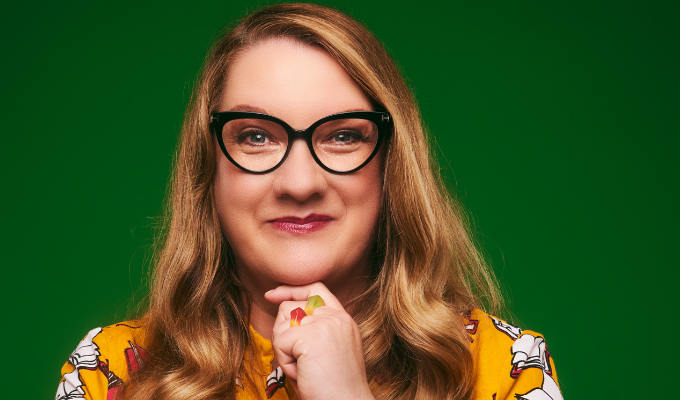
How to make the Fringe less stressful for performers
Free stuff, basically, as Juliette Burton explains...
 The consensus is that the Edinburgh Fringe is at breaking point, having grown so big that costs – especially for accommodation – have skyrocketed, pricing out all but those with the deepest pockets. Here's the last in our series of articles asking participants if they have any ideas to make the festival better...
The consensus is that the Edinburgh Fringe is at breaking point, having grown so big that costs – especially for accommodation – have skyrocketed, pricing out all but those with the deepest pockets. Here's the last in our series of articles asking participants if they have any ideas to make the festival better...
‘So… Do you have mental health?’
This was how many well-meaning people spoke to me when I first started talking more personally on-stage over a decade ago.
I’m pleased to say this has changed. Our collective understanding of mental health has risen in line with NHS waiting lists. There’s now a broad understanding that everyone has ‘mental health’ just like everyone has ‘physical health’ (although it feels like performers are running low on both by the end of the Fringe).
The Edinburgh Fringe is a global beacon of creativity. As a fledgling stand-up I was drawn to it like a moth to a flame. A flame which burns increasingly large holes in my pockets every year.
Financial anxieties aside, I believe the Fringe has the potential to deliver massive benefits to the mental health of performers and audiences alike. This is a niche stance given its reputation as industry endorsed psychological torture, but with studies linking creativity to reduced anxiety, increased positivity and a guard against the symptoms of depression, the world’s biggest arts festival should surely be part of the solution to the ongoing mental health crisis – not contributing to it.
I feel well placed to fix it. I’ve been sectioned under the Mental Health Act, had five stays in hospital for mental illnesses, 15 individual mental health diagnoses and, earlier in 2024, decided to do two brand new stand-up shows at the Edinburgh Fringe. With hindsight, that last one might be the biggest red flag of all.
(One of these shows is about hope in the face of hopelessness. An article about saving your mental health at the fringe is painfully on-brand).
So, as a comic and lunatic, what do I think has gone wrong?
In a word, stress. Stress is a huge contributing factor to the development of poor mental health. Although not a mental illness itself, it can be both a cause and a symptom on one.
More could be done to warn fringe performers a) what stress is and b) how it can positively or negatively influence us – like a producer warning us about reading reviews.
It’s vital we learn how to reduce stress. It can be managed by exercise, eating well, sleeping well, connecting with others and giving back – all things which sound perfectly achievable right up until July 31 when they all go out the Georgian townhouse window.
So how do we stay on-track? Well, if you don’t ask you don’t get, so here are my Five Fringe Freebies - things which the council, companies and organisations within the city could do to help.
1) Free gym membership
Yes, acts are already always on the go - flyering, performing or just sweating profusely in a poorly air-conditioned room - but staying active can really help. I’d love to see discounts or free gym memberships offered to performers for the month. Sure we already have free saunas or as they’re otherwise known, sweaty Cowgate venues, but a gym might improve health, not threaten it. Or, at the very least, we could have well organised group runs or exercise activities.
It’ll be good for locals too. Imagine seeing a crowd of people with headphones on and a smile on their faces coming towards you and discovering they’re not on the silent disco tour. The sheer relief. What a thrill.
2) Free tickets
With 1.9 million people queuing for mental health services in the UK, chances are most mental health themed socialising is currently being done in doctors waiting rooms.
Socialising is important. Deep, meaningful connections are vital but difficult in Edinburgh where people are… sorry, are you looking over my shoulder? Who’s behind me? Are they important?
Could there be more opportunities to encourage real socialisation? To pair up with a performer pal and do something fun? Hey, there’s a festival on! Maybe we could give comedians comp tickets to see circus acts? Give circus acts comp tickets to see musicians? Give musicians comps to see comedians? Or let’s do it all-at-once and all see a one-man-band tell a joke on a high-wire. That doesn’t sound stressful at all!
3) Free silence
Been social? Good. Now don’t be.
Being at the Fringe means being ‘on’ but once I’m done, I like to be ‘off’. Alone. Somewhere very quiet. And having a nap at the back of a poorly attended show doesn’t count.
The Fringe is already giving out sensory packages for people who find the festival overwhelming, but what’s included won’t suit everyone. I’ve broken more fidget toys than I care to remember and sunglasses in Edinburgh can seem sarcastic. I’d suggest sensory deprivation zones - spaces around the city with blacked out walls, weighted blankets and other tools to help people decompress. Bet you’d still get flyered though.
Alternatively, how about free massages? It’s hugely helpful for somatic healing, nervous system management or whatever the technical term is for the numb butt cheeks you get from sitting on plastic seats all day.
4) Free days
We must stop encouraging burnout. The glorification of endless hours of work, promotion and gigs leading to exhaustion and fringe flu is dangerous and, yes, I did offer to write articles for Chortle, because I want to appear prolific, productive and keen. Let’s normalise more days off for all performers so acts can rest, forge longer-term relationships or write a more articles Chortle didn’t ask for.
5) Free (good) food
Take it from someone who has had a variety of eating disorders – you are what you eat. And we need to be more than nothing.
We all know the benefits of good nutrition, but late nights and lettuce rarely go hand-in-hand (well, not without kebab meat) so could there be more offers of free or discounted food for performers at juice and salad bars?
They say there’s no such thing as a free lunch, and I’m aware I’ve just asked for a free lunch plus five more things (Six in total? Snuck that in, didn’t I?) but while my ideas may combat stress, they don’t tackle the root cause.
Performing at the fringe comes at a great cost and there are two currencies we’re trading in - money and trauma. We all know the financial demands, but what about the content of the shows themselves? My fear is there is an incentive to commodify traumatic experiences in exchange for laughs and cash. And I should know.
Comedy shows about mental health became trendy enough for a mad woman like me to win awards. I was called ‘inspirational’ five times in a single review by someone who desperately needed a nap, a cry and a thesaurus.
I felt emboldened and encouraged to share even more, determined to find funnier ways to describe what I’d experienced. If there’s more trauma to mine, the temptation to do so is immense - especially when there’s a preview looming and thousands of pounds at stake. But support is needed, together with an increased awareness of the risks of embarking on such a project.
The conversation around mental health is changing. We know there needs to be action taken to reduce stress to artists and audience members at the fringe and beyond, not just for the 3 weeks of the fringe, but throughout the year.
Or, failing that, a voucher for John Lewis or something. Seven things.
• Juliette Burton is performing Hopepunk at Gilded Balloon Patter House from July 31 to August 17 at 7.40pm and Going Rogue, a work-in-progress show at The Counting House from August 19 to 25 at 11.45am.
Published: 28 Jul 2024






